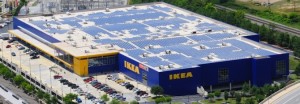In Peter Kelly-Detwiler’s “IKEA’s Aggressive Approach To Sustainability Creates Enormous Business Opportunities”, IKEA demonstrates the concept of sustainability by “[following] its commitment to develop and own renewable electricity supplies”. By doing this, IKEA is able to balance the importance of three basic elements of sustainability, environmentally responsible, socially responsible, and economically responsible. Through such implementation, IKEA will “reduce CO2 emission by 10% over 5 years”. At the same time, IKEA is also moving towards socially responsible by selling more environmental-friendly products, such as LEDs and water efficient taps and attempting to take on the leadership role in sustainability. Moreover, IKEA considers this as a long-term investment that will decrease the overall cost and provide “good returns with manageable risks”.
Even though the effects of IKEA’s action may not seem apparent, but if every stakeholder is willing to do their parts in sustainability, it would be make a huge difference in the big picture. While as a household, one can support sustainability by growing their own fruits and vegetable at their backyards, or regularly recycling plastic bottles. Firms can further choose to use renewable resources similar to IKEA, or even by turning the light off whenever there is no one in the office. By implementing such routines in the daily basis, the Earth will be sincerely thankful.
Reference:
